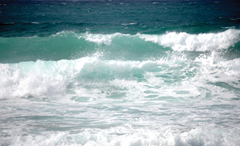Northern Ireland’s marine potential
 A draft Offshore Renewable Energy Strategic Action Plan from DETI has proposed targets of 600MW from offshore wind and 300MW from tidal resources to be produced off the province’s north and east coasts by 2020.
A draft Offshore Renewable Energy Strategic Action Plan from DETI has proposed targets of 600MW from offshore wind and 300MW from tidal resources to be produced off the province’s north and east coasts by 2020.
“I am very pleased that the Crown Estate has confirmed the next steps in the development of marine renewable energy in Northern Ireland waters,” commented the Minister for Enterprise, Trade and Investment, Arlene Foster, in April 2011.
A strategic environmental assessment of offshore wind and marine renewable energy for Northern Ireland (published in March 2010) concluded that between 900MW and 1,200MW of electricity could be generated from offshore wind and tidal in Northern Ireland waters by 2020 without significant adverse effects on the environment and other sea users.
The department predicts that this will “bring significant economic benefits” to Northern Ireland and contribute to it meeting its 40 per cent target for renewable electricity by 2020.
Subsequently, in April 2011, the Crown Estate, which owns the region’s seabed, launched a consultation inviting industry views on how areas of the seabed could be made available for renewable energy projects. Prospective developers of offshore wind and tidal stream projects were asked which areas in Northern Ireland waters are most attractive for development and how they would wish to see development rights provided by the Crown Estate.
That consultation ended in May 2011 and a leasing round is expected in September. The Crown Estate suggested that it start parallel leasing rounds for offshore wind and tidal stream projects in September, with the final development rights being awarded as early as spring 2012.
Eight zones were identified: five for tidal projects, two for wind and one for wave.
The department says it is currently working to assist the potential development of offshore wind and tidal stream projects by:
• preparing an onshore renewable energy strategic action plan which considers grid strengthening for onshore and offshore electricity generation;
• marketing (done by Invest NI and the Crown Estate) Northern Ireland’s infrastructure facilities for the offshore energy sector and supporting local companies in this growing market;
• working with the Department of the Environment on the forthcoming Northern Ireland Marine Bill and the opportunity to streamline the licensing and consenting processes for offshore energy projects;
• preparing a statement on DETI’s December 2010 proposal to increase support levels for tidal stream projects under the Northern Ireland Renewables Obligation to four renewable obligation from two certificates (ROCs); and
• making the harnessing and exploiting of offshore renewable energy a top priority so that the Northern Ireland Leasing Round can be successfully completed in the timelines announced.
The allocation of ROCs to offshore projects still lies within the remit of the UK’s Department of Energy and Climate Change (while onshore ROCs can be administered by DETI). DETI therefore proposes that those powers be devolved. The DECC has agreed, acknowledging that the region’s territorial waters are within the full competence of the Northern Ireland Assembly.
DETI’s draft Offshore Renewable Energy Strategic Action Plan stated: “Potential investors need reassurance therefore a decision will be made on this as soon as possible.” However, it is unlikely a decision on the transfer of this power to DETI will be made before the launch of the leasing round.





